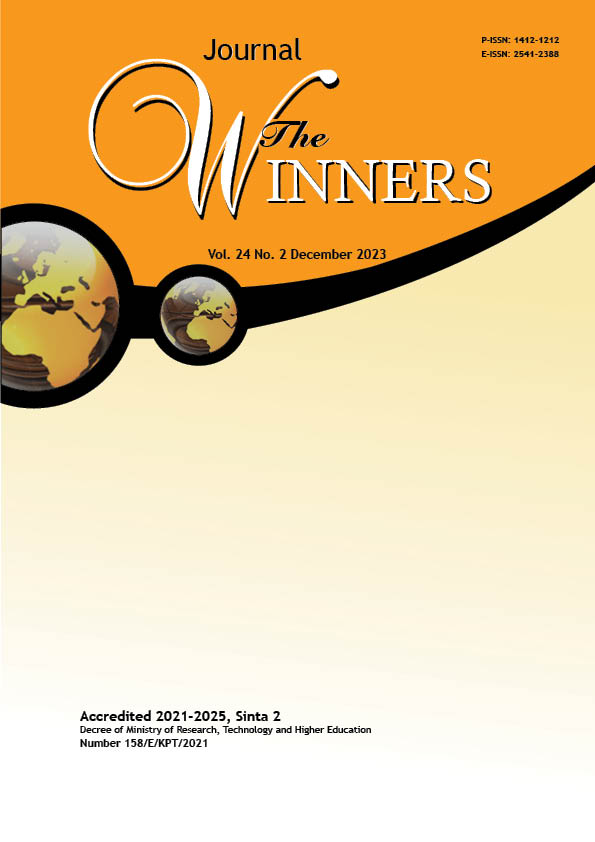Impact of E–Supply Chain Management on Customer Satisfaction Through Service Quality in Agricultural E-Commerce
DOI:
https://doi.org/10.21512/tw.v24i2.11041Keywords:
e-supply chain management, customer satisfaction, service quality, e-commerceAbstract
The research aimed to assess the impact of applying e-supply chain management (E-SCM) on service quality (SQ) and customer satisfaction (CS) in agricultural e-commerce. It was motivated by challenges in Indonesia that led to food
waste due to lengthy supply chain, particularly evident in the horticulture category, such as vegetables. The inefficiencies along the chain resulted in substantial annual losses, ranging from IDR 213 to 551 trillion, equivalent to 4% - 5% of Indonesian GDP. Using associative investigation with three variables and 446 samples selected through simple random sampling, the research aimed to evaluate and enhance E-SCM performance in supply chain. The effective application
of E-SCM offered benefits, including time and cost efficiency, work flexibility, and other conveniences. Not only this did benefit the company but also enhanced service quality and customer satisfaction. SEM-PLS was used with a reflective method, and data processing was facilitated by SMART-PLS 4 software. The results show a significant influence of
E-SCM application on service quality and customer satisfaction. Furthermore, service quality has a significant and direct impact on customer satisfaction. E-SCM influences customer satisfaction through both direct and indirect pathways, which are mediated by service quality variables.Â
References
Abdirad, M., & Krishnan, K. (2022). Examining the impact of E-supply chain on service quality and customer satisfaction: A case study. International Journal of Quality and Service Sciences, 14(2), 274-290. https://doi.org/10.1108/IJQSS-08-2020-0131.
Avkiran, N. K., & Ringle, C. M. (2018). Partial least squares structural equation modeling: Recent advances in banking and finance. Springer.
Bappenas. (2021). Food Loss and Waste Di Indonesia. Jakarta: Low Carbon Development Indonesia.
Baroto, K. S. (2018). Factors affecting the effectiveness of SCM-IS: A case of XYZ. 2018 International Conference on Computing, Engineering, and Design (ICCED), 175-180.
BPS: Pertanian dan tiga sektor utama sumbang PDB Triwulan IV 2021. (2022, February 7). Nasional.tempo.co. https://nasional.tempo.co/read/1558396/bps-pertanian-dan-tiga-sektor-utama-sumbang-pdb-triwulan-iv-2021/full&view=ok.
BPS - Statistics Indonesia (2022). Indonesia economic growth quarter I - 2022. Jakarta: Badan Pusat Statistik.
Chavez, R., Yu, W., Jacobs, M. A., & Feng, M. (2017). Data-driven supply chains, manufacturing capability and customer satisfaction. Production Planning and Control, 28(11/12), 906-918. https://doi.org/10.1080/09537287.2017.1336788.
Gogoi, B. J. (2020). Service quality measures: How it impacts customer satisfaction and loyalty. International Journal of Management (IJM), 11(3), 354-365.
Hair, J., Hult, G. T., Ringle, C. M., & Sarstedt, M. (2017). A primer on partial least squares structural equation modeling (PLS-SEM). SAGE Publication, Inc.
Tan, T. L., & Trang, D. T. D. (2017). Issues of implementing electronic supply chain management (E-SCM) in enterprise. European Business and Management, 3(5), 86-94. https://doi.org/10.11648/j.ebm.20170305.13.
Le, D. N., Nguyen, H. T., & Truong, P. H. (2020). Port logistics service quality and customer satisfaction: Empirical evidence from Vietnam. The Asian Journal of Shipping and Logistics, 36(2), 89-103. https://doi.org/10.1016/j.ajsl.2019.10.003.
Mutiah, D. (2021, October 26). Distribusi produk pertanian masih jadi pekerjaan rumah menantang di Indonesia. Liputan6.com. https://www.liputan6.com/lifestyle/read/4693637/distribusi-produk-pertanian-masih-jadi-pekerjaan-rumah-menantang-di-indonesia.
Omoruyi, O., & Mafini, C. (2016). Supply chain management and customer satisfaction in small to medium enterprises. Studia UBB Economica, 61(3), 43-58. https://doi.org/10.1515/subboec-2016-0004.
Pakurár, M. H., Haddad, H., Nagy, J., Popp, J., & Oláh, J. (2019). The service quality dimensions that affect customer satisfaction in the Jordanian banking sector. Sustainability, 11(4). https://doi.org/10.3390/su11041113.
Rachmawati, D. Z., & Agus, A. A. (2020). E-service and logistics service quality in e-commerce, study case: Shopee Indonesia. 2020 3rd International Conference on Computer and Informatics Engineering (IC2IE), 218-223. https://doi.org/10.1109/IC2IE50715.2020.9274597.
Rizaty, M. A. (2021, November 25). Transaksi E-Commerce Indonesia Diproyeksikan Capai Rp 403 Triliun pada 2021. Databoks.katadata.co.id. https://databoks.katadata.co.id/datapublish/2021/11/25/transaksi-e-commerce-indonesia-diproyeksikan-capai-rp-403-triliun-pada-2021.
Sandi, F. (2022, January 10). Konsumen komplain makin banyak, e-commerce biang keroknya! CNBC Indonesia https://www.cnbcindonesia.com/news/20220110120906-4-305975/konsumen-komplain-makin-banyak-e-commerce-biang-keroknya.
Sekaran, U., & Bougie, R. (2016). Research methods for business: A skill-building approach (7th Ed.). United Kingdom: Wiley.
Shamout, M. D., & Elayan, M. B. (2018). A data article on E-supply chain benefits from supplier׳ s perspective. Data in Brief, 21, 2441-2446. https://doi.org/10.1016/j.dib.2018.11.086.
Turban, E. Outland, J., King, D., Lee, J. K., Liang, T-P., & Turban, D. C. (2018). Electronic Commerce 2018: A Managerial and Social Networks Perspective. Cham: Springer International Publishing.
Uvet, H. (2020). Importance of logistics service quality in customer satisfaction: An empirical study. Operations and Supply Chain Management: An International Journal, 13(1), 1-10. http://doi.org/10.31387/oscm0400248.
Zand, A. & Dehyouri, S. (2022). Path analysis of the effect of supply chain management and total quality management on improving employees services quality. Journal of Agricultural Science and Technology, 24(1), 43-56. http://dorl.net/dor/20.1001.1.16807073.2022.24.1.3.3.
Downloads
Published
How to Cite
Issue
Section
License
Copyright (c) 2023 Yuli Eni, Anggraini Kumala Chandra

This work is licensed under a Creative Commons Attribution-ShareAlike 4.0 International License.
Authors who publish with this journal agree to the following terms:
a. Authors retain copyright and grant the journal right of first publication with the work simultaneously licensed under a Creative Commons Attribution License - Share Alike that allows others to share the work with an acknowledgment of the work's authorship and initial publication in this journal.
b. Authors are able to enter into separate, additional contractual arrangements for the non-exclusive distribution of the journal's published version of the work (e.g., post it to an institutional repository or publish it in a book), with an acknowledgment of its initial publication in this journal.
c. Authors are permitted and encouraged to post their work online (e.g., in institutional repositories or on their website) prior to and during the submission process, as it can lead to productive exchanges, as well as earlier and greater citation of published work.
USER RIGHTS
All articles published Open Access will be immediately and permanently free for everyone to read and download. We are continuously working with our author communities to select the best choice of license options, currently being defined for this journal as follows: Creative Commons Attribution-Share Alike (CC BY-SA)

















